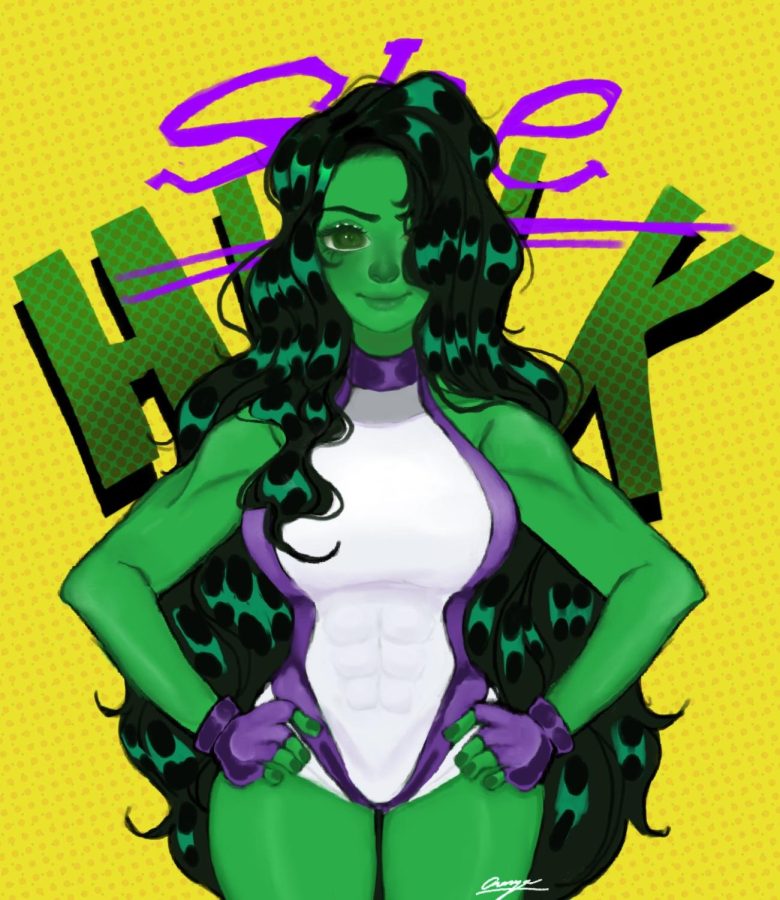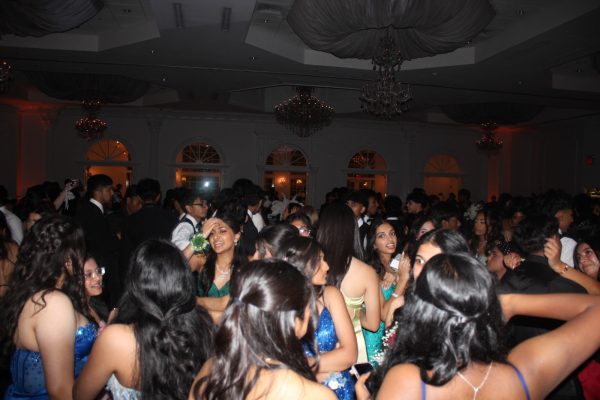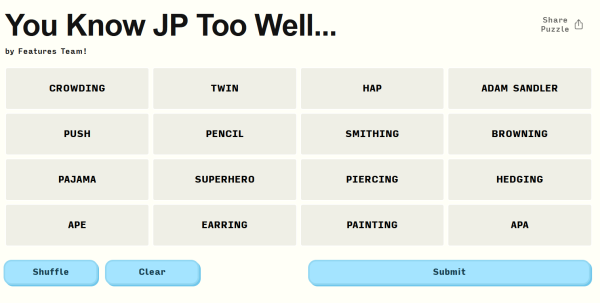In Defense of She-Hulk
Here comes She-Hulk! She-Hulk stands in front of a comic-like backdrop wearing her iconic outfit.
December 1, 2022
The Marvel Cinematic Universe has expanded past its original bounds into a new era: Phase 4. Since the premiere of WandaVision in January 2021, Marvel has been releasing new shows and movies that introduce many new characters who will build the foundation of the new Avengers’ legacy. This also poses a shift in the stories told—as the characters portrayed are members of more recent comics from the 90s and onwards, their stories are increasingly progressive, bringing about further diversity and new perspectives within the films and shows.
Although this change is parallelling the progression of perspectives in society, many Marvel fans are resistant to it, revealing the dark underbelly of the fanbase. Among recent controversies was the release of the She-Hulk series, following lawyer Jennifer Walters as she deals with assuming Hulk-like powers through a freak accident. The show amplifies the female voice and experience while highlighting the misogyny many women face in their daily lives. At the same time, the show at its core is a comedy—a format that some Marvel fans didn’t appreciate. It is apparent, however, that we need more shows like She-Hulk in the superhero genre—ones that tackle important issues while maintaining an engaging and comedic tone.
She-Hulk masterfully presents the female perspective, addressing anticipated misogynistic reactions to the show by shutting down these viewpoints about the character and her story. When the comics and the show were first announced, She-Hulk’s character was faced with immediate backlash, with many misogynistic fans angrily stating that Marvel didn’t need female versions of classic characters. Within the show, Jennifer Walters faces the exact same type of backlash: harassment online by a group called Intelligencia, whose comments inside the show were copied almost exactly from comments in real life about the release of the show. The irony of this presentation perfectly set up the importance of female representation in media, especially in the male-dominated Marvel Cinematic Universe.
Through Jennifer Walters’s example, the show takes down typical stereotypes of female characters in the media, usually portrayed as emotional, femme fatales, or meeting the common end of ‘fridging’— killed off to propel a male protagonist’s character development. She-Hulk portrays a strong female protagonist who isn’t afraid to voice her opinion or represent her emotions, which is something unique not only to Marvel but also popular media in general. She-Hulk should be the first of many more shows to speak outright against the box placed around female characters, and should pave the way for more female characters to exist in superhero films and series. Marvel is stepping into a more progressive side of media, and with the introduction of characters of diverse cultures and genders, there may yet be a revolution in superhero expectations.
The show is also a refreshing difference from the usual tone of the Marvel movies. Throughout Phases One through Three, the Marvel universe has dealt with many intense, battle-heavy action films. A true comedy within Marvel canon hadn’t existed until the introduction of She-Hulk. The show was specifically branded to be a comedy, yet still faced backlash when it lived up to its genre. The underbelly of the Marvel fandom was quick to criticize the quick quips and fourth wall breaks that many felt did not fit the tone of the MCU.
However, this type of storytelling is essential to combine comedy with important messaging. Public perception of films in general typically see darker, more serious films delivering messages that relate to real-world issues, but She-Hulk showed that topics like feminism, racism, and equal rights can still be discussed within a comedic setting. Although a lot of backlash wondered how Marvel went from making blockbusters like Avengers: Infinity War to creating scenes of She-Hulk twerking with Megan Thee Stallion, an important question has to be asked: if She-Hulk was replaced with Deadpool, how much of this backlash would really be reiterated? By placing a female character in a highly comedic role and pushing the boundaries of comedy scenes on screen, Marvel is changing the narrative in their media and introducing a new level of film that the universe desperately needs. With the introduction of diverse stories, new genres, and comedic elements, the MCU is finally pushing the boundaries of its filmmaking.
She-Hulk is innovative in its introduction of diverse stories and new story formats to the MCU, proving its necessity in advancing the popularity of its shows and movies. Though She-Hulk is only one show, it is the stepping stone towards the future. Marvel’s goal to introduce more modern ideals and characters into its films will pave the path for better representation, diversity, and more fun in films. It’s an exciting time to be a Marvel fan, and it’ll be interesting to see what’s next.







































